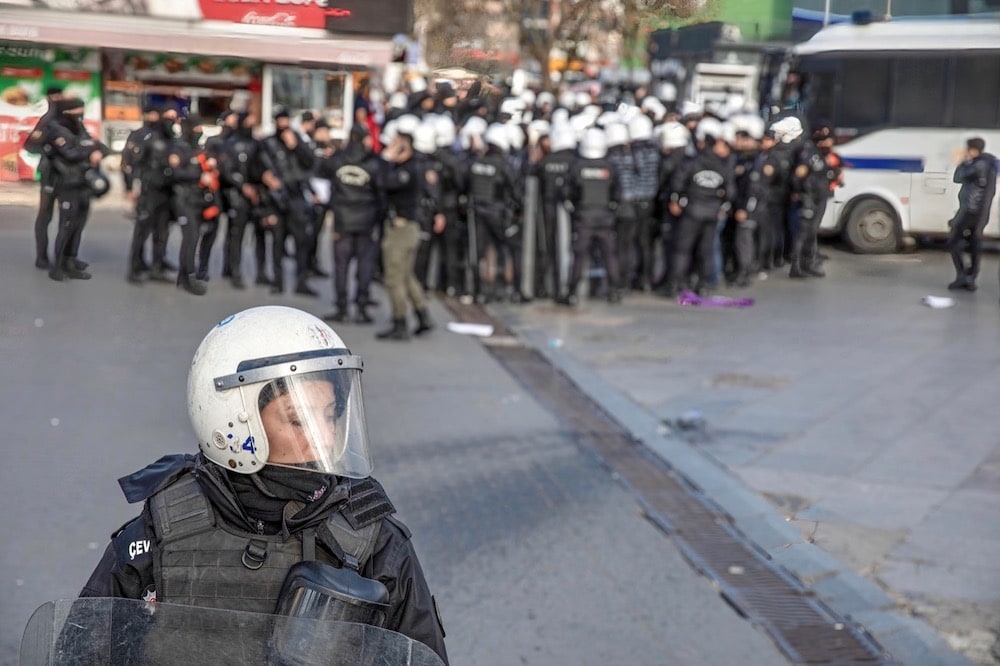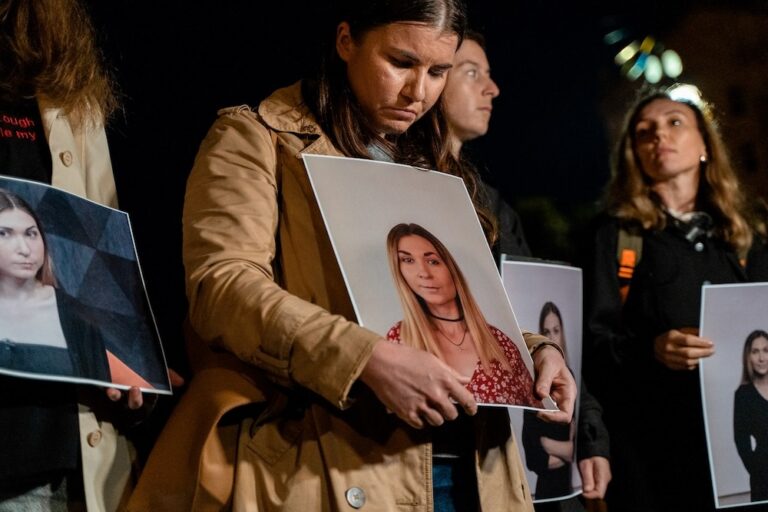November 2022 in Europe and Central Asia: A free expression round up produced by IFEX's Regional Editor Cathal Sheerin, based on IFEX member reports and news from the region.
Central Asia’s best-known anti-corruption journalist deported from Kyrgyzstan; Italian Prime Minister’s defamation cases against Roberto Saviano and ‘Domani’ newspaper; the International Day for the Elimination of Violence Against Women marred by arrests and police violence in Turkey; new threats to LGBTQI+ free expression in Russia; the Day of Solidarity with Political Prisoners in Belarus.
“We do not want permission, we want a life without violence”
It’s a grim irony that the International Day for the Elimination of Violence Against Women (25 November) saw – once again – large numbers of women’s rights activists arrested at demonstrations across Turkey, and many beaten by police officers.
Although various local authorities imposed bans on events marking the day (with Istanbul also deploying water cannons in advance), women’s groups such as the Istanbul-based 25 November Women’s Platform refused to abide by the prohibition: “We do not want permission [to protest]”, they declared, “we want a life without violence”.
Women were arrested in Ankara and in the Kurdish-majority provinces of Şırnak, Van, Ağrı and Mardin; over 100 women were arrested in Istanbul.
Misogynistic violence and femicide are endemic in Turkey. IFEX member Bianet publishes monthly and yearly reports showing the extent of the problem; the numbers are shocking.
According to Bianet, in the 326 days between 1 January 2022 and 23 November 2022, men committed at least 296 femicides and inflicted violence on at least 715 women. Most of this occurred within the family: “218 women were killed by their husbands or boyfriends, 23 women were killed by their fathers, brothers or sons, eight women were killed by their sons-in-law”.
The state has a very poor record when it comes to protecting women from violence. Although it introduced an app in 2018, via which women can report attacks (approximately 355,366 women had used it to report acts of violence by July 2022), it also withdrew from the landmark Istanbul Convention on violence against women in 2021. That year saw a spike in recorded attacks on women.
In a report published in May 2022, Human Rights Watch (HRW) accused the Turkish government of “failing victims of domestic violence”. HRW found that although Turkish courts were issuing more restraining orders against perpetrators of violence, the frequent failure to enforce these orders meant that “women on the authorities’ radar have been killed by their abusers or subject to recurrent violence over years”.
But it’s not just the state’s poor record on defending women from violence that’s the problem: the authorities themselves appear determined to restrict the space for women’s rights activism.
In April 2022, the Istanbul Public Prosecutor’s Office filed a lawsuit against the women’s group We Will Stop Femicide (WWSF), which it accused of “acting against the law and morality”. The lawsuit was filed after several complaints about the organisation, including accusations that it had “disintegrated the family structure by ignoring the concept of family”. WWSF has frequently criticised the government for its poor record on dealing with violence against women and has called on Turkey to reinstate the Istanbul Convention. The most recent court hearing in the lawsuit against WWSF took place in October; the Prosecutor’s Office is seeking to shut the group down.
“We’ll protect our family structure from all kinds of perversion”
The reasons given by the Turkish government for its decision to quit the Istanbul Convention in 2021 were that the convention was being used to “normalise homosexuality”, and that it was therefore “incompatible with Turkey’s social and family values”.
This is the same kind of thinking that appears to be fuelling the government’s current plan to introduce a constitutional amendment “to protect the family”. Details of what such an amendment would entail have not been disclosed, but it is telling that this proposal has been announced while anti-LGBTQI+ rallies are on the rise in Turkey. The organisers of the demonstrations have called for a law prohibiting so-called ‘gay propaganda’ and for the shutting down of LGBTQI+ associations and public, LGBTQI+ related activities.
These rallies are openly backed by the government. President Erdoğan made his support for them clear during a recent TV interview. “It’s not anyone’s place to make the family structure of this nation degenerate”, he said: “We’ll protect our family structure from all kinds of perversion, marginal movements and corruption”.
In November, Turkey’s Interior Minister publicly described the LGBTQI+ community as “cultural terrorism” which “tries to make people forget their values, their religion, unity, parental love and family loyalty. It is exactly Europe’s policy, exactly America’s policy of divide and rule”.
“A blanket ban”
The homophobic language being used by leading Turkish politicians – with references to tradition, the family, ‘the west’ etc – will sound very familiar to anyone who has observed events in Russia over the last decade. During this period, Russian lawmakers passed a raft of anti-LGBTQI+ legislation, including the notorious so-called ‘gay propaganda’ law (2013), which – under the guise of protecting minors from the ‘promotion’ of ‘non-traditional sexual relationships’ – placed harsh restrictions on LGBTQI+ free expression and civic space.
November saw further worrying developments for the Russian LGBTQI+ community. Early in the month, President Putin signed a decree vowing to defend traditional Russian values against threats from the United States, terrorists, and “gay propaganda”. The decree referred to “certain organisations and people on Russian soil” that seek “the destruction of the traditional family unit through the propaganda of non-traditional sexual relationships”.
Later in the month, Russia’s State Duma passed draft legislation that widens the ban on ‘gay propaganda’ and further restricts LGBTQI+ expression. As HRW reports, the draft law amounts to “a blanket ban” that “prohibits sharing positive and even neutral information about lesbian, gay, bisexual, and transgender (LGBT) people, and publicly displaying non-heterosexual orientations”. The legislation now has to be approved by the parliament’s upper house and the president.
Punished for impoliteness
On 27 November, rights groups and others marked the Day of Solidarity with Political Prisoners in Belarus. According to human rights defenders Viasna, there are currently 1,445 political prisoners languishing in Belarusian prisons. Among these prisoners are several members of Viasna: some of these have already been convicted and handed heavy prison sentences on spurious charges; others are still awaiting trial after more than 500 days behind bars. Ales Bialiatski, founder of Viasna and recent winner of the Nobel Peace Prize, is one of the latter. Charged with smuggling and financing protests, he faces between seven and 12 years in prison if convicted.
Another well-known political prisoner is Maria Kalesnikava (a member of the opposition Coordination Council), who was sentenced to 11 years in prison in 2021 for her opposition activism. This month, it was reported that she had been placed in an isolation cell as punishment, apparently for ‘impoliteness’.
The Belarusian Association of Journalists (BAJ) and the European Federation of Journalists (EFJ) marked the day of solidarity by urging the public to send letters of support to Belarus’s 32 jailed journalists. Several of these journalists have recently been added to the KGB’s ‘terrorist’ list.
In brief
In November, investigative journalist Roberto Saviano went on trial for criminal defamation after he called Italy’s far-right prime minister, Giorgia Meloni, a “bastard”. Saviano’s comment was a response to Meloni’s call for migrants to be repatriated, and for the boats used to rescue refugees from the sea to be sunk. IFEX joined press freedom groups in calling on Meloni to immediately withdraw her lawsuit against Saviano, and on Italy to bring forward anti-SLAPP legislation to tackle the use of vexatious lawsuits. If convicted, Saviano faces up to three years in prison.
PM Meloni has also initiated a criminal defamation lawsuit against the newspaper Domani, which published an article in 2021 about Meloni’s alleged role (when she was an MP) in the government’s procurement of face masks during the COVID-19 pandemic. According to the authors of the article, Meloni’s involvement resulted in the contract being awarded to a fellow member of the Fratelli d’Italia Party. A preliminary hearing took place on 15 November and the trial is due to begin in July 2024.
In Kyrgyzstan, authorities ordered the deportation to Russia of Central Asia’s best known anti-corruption investigator, Bolot Temirov. Temirov, who has been the target of judicial harassment for many months, was recently convicted of allegedly using forged documents to obtain a Kyrgyz passport, but acquitted of charges of drugs possession and crossing the border illegally.
Temirov was arrested and charged in April 2022 after he and his colleagues published a story about how the son of the head of the security services had secured a government contract to supply fuel. The contract was not put out to tender and the article alleged favouritism. Kyrgyzstan’s populist president, Sadyr Japarov, then prejudiced pending rulings by publicly claiming that the journalist had forged his identity documents.
Also this month, the Kyrgyz government proposed draft legislation that would enable it to restrict citizens’ right to freedom of association and strengthen regulation and control over non-governmental organisations. The proposed draft Law on Non-Commercial Non-Governmental Organisations comes amid serious concerns about the human rights situation in Kyrgyzstan, and after the mass arrest of activists last month. HRW provides the details here.



